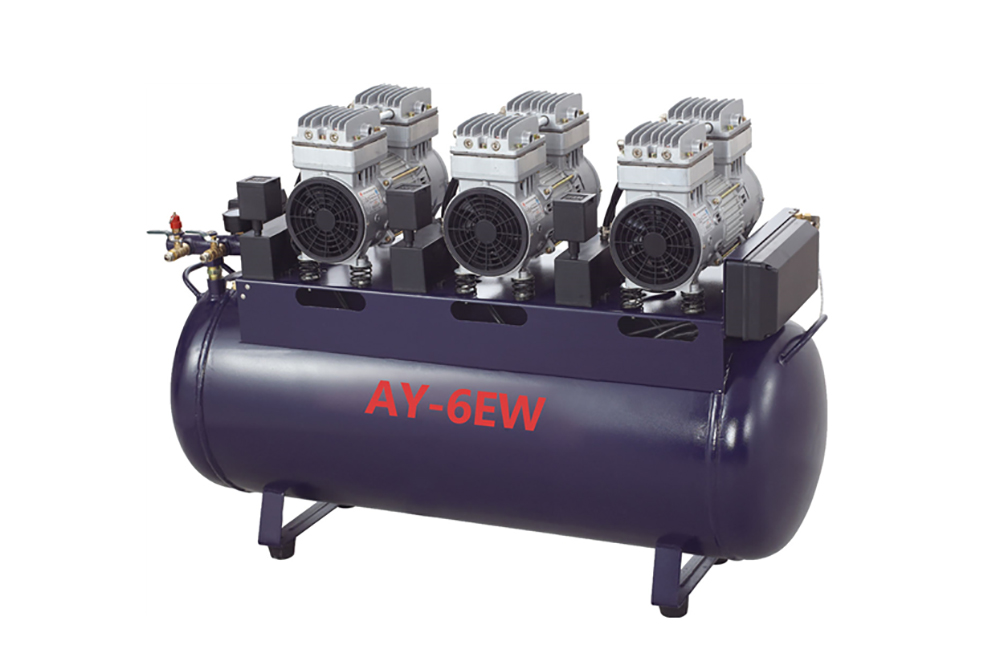Oil-Free Air Compressors for Modern Dentistry
In the world of modern dentistry, precision and patient safety are paramount. Dental practitioners rely on a multitude of tools and equipment to ensure the highest standards of care, and the dental air compressor is a crucial device. However, not all air compressors are created equal. In this article, we delve into the realm of dental oil-free air compressors, shedding light on their pivotal role and the myriad advantages they offer.
Maintaining Sterile Environments: Oil-free technology contributes to a pristine dental workspace. It ensures that the compressed air used for procedures is free from any impurities that could compromise the sterility of instruments, surfaces, and the treatment area as a whole.
A Quieter Dental Experience: Reduced noise levels contribute to a more relaxed and comfortable patient experience. Patients can converse with their dentists without raised voices, and practitioners can focus on their work without the distraction of a loud compressor in the background.
Surgical Tools: For surgical procedures, precision and consistency are paramount. Dental oil-free air compressors should deliver the precise airflow and pressure required to operate surgical tools effectively, guaranteeing successful procedures.
Mobility for Different Treatment Rooms: If your practice includes multiple treatment rooms, consider the mobility of your compressor. Portability can make it easier to move the compressor between rooms, ensuring that each treatment area is adequately equipped.
Conclusion
Oil-free air compressors for dental use are essential for maintaining high patient safety standards, infection control, and operational efficiency. Dental practitioners can make informed choices by understanding more about these compressors, ultimately enhancing the quality of care and overall patient experience. Please feel free to contact us at info@anyafs.com.cn or sales@anyafs.com.cn for further details about more top-quality dental equipment parts!
The Significance of Dental Air Compressors
Dental air compressors are silent workhorses that power dental chairs, handpieces, and a host of other essential instruments. They generate the compressed air needed to drive dental equipment with precision, efficiency, and reliability. This makes them an indispensable component of any dental practice, whether large or small.The Advantages of Oil-Free Technology
What sets dental oil-free air compressors apart from their oil-lubricated counterparts is their ability to deliver pristine, contaminant-free compressed air. This is achieved through cutting-edge technology that eliminates the use of lubricating oil in the compression process. Let's delve deeper into this innovative technology.The Role of Air Quality in Dental Procedures
Contaminants in Compressed Air
Contaminants in compressed air can have dire consequences in dental procedures. Oil particles and moisture can damage delicate instruments, compromise the quality of work, and, most importantly, pose a health risk to patients by potentially introducing harmful substances into their oral cavities.Patient Safety and Sterilization
Infection control is a cornerstone of dental practice. Dental oil-free air compressors play a pivotal role in maintaining the sterility of dental environments, reducing the risk of cross-contamination, and ensuring patient safety during procedures.Dental Oil-Free Air Compressor: Components and Functionality
Air Compression Mechanism
Dental oil-free air compressors employ a piston or rotary screw mechanism to compress air. In the absence of oil, there is no risk of oil contaminants entering the compressed air stream. This ensures the air delivered to dental instruments remains pure and free from potentially harmful particles.Filtration Systems
To maintain the highest air quality standards, these compressors are equipped with advanced filtration systems. These systems effectively remove moisture, particles, and any residual oil remnants that may still be present in the air, guaranteeing the delivery of clean, dry, and uncontaminated compressed air.Benefits of Choosing Oil-Free Compressors for Dental Practices
Enhanced Infection Control
Eliminating Oil Contamination Risks: By eliminating oil from the compression process, dental oil-free air compressors eliminate the primary source of contamination in the compressed air. This reduces the risk of cross-contamination between patients and minimizes the potential transmission of pathogens.Maintaining Sterile Environments: Oil-free technology contributes to a pristine dental workspace. It ensures that the compressed air used for procedures is free from any impurities that could compromise the sterility of instruments, surfaces, and the treatment area as a whole.
Noise Reduction and Patient Comfort
Low Decibel Levels: Traditional air compressors can be noisy, causing discomfort to both patients and dental practitioners. Dental oil-free air compressors, however, operate at significantly lower decibel levels, creating a more serene and patient-friendly environment.A Quieter Dental Experience: Reduced noise levels contribute to a more relaxed and comfortable patient experience. Patients can converse with their dentists without raised voices, and practitioners can focus on their work without the distraction of a loud compressor in the background.
Factors to Consider When Selecting a Dental Oil-Free Air Compressor
Airflow and Pressure Requirements
Dental Chair Equipment: Different dental procedures require varying levels of compressed air. It's crucial to choose a compressor that can meet the specific airflow and pressure demands of your dental chair equipment, ensuring optimal performance.Surgical Tools: For surgical procedures, precision and consistency are paramount. Dental oil-free air compressors should deliver the precise airflow and pressure required to operate surgical tools effectively, guaranteeing successful procedures.
Size and Portability
Space Constraints: Dental practices often have limited space. Selecting a compressor that fits within the available space is essential. Compact and space-efficient oil-free compressors can be a lifesaver in tight quarters.Mobility for Different Treatment Rooms: If your practice includes multiple treatment rooms, consider the mobility of your compressor. Portability can make it easier to move the compressor between rooms, ensuring that each treatment area is adequately equipped.
Conclusion
Oil-free air compressors for dental use are essential for maintaining high patient safety standards, infection control, and operational efficiency. Dental practitioners can make informed choices by understanding more about these compressors, ultimately enhancing the quality of care and overall patient experience. Please feel free to contact us at info@anyafs.com.cn or sales@anyafs.com.cn for further details about more top-quality dental equipment parts!


